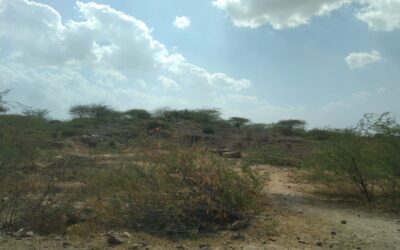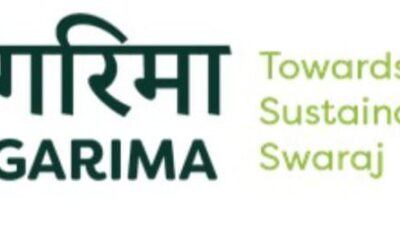“I am Jeena*, 28 years old, and I work on the farms”. After all the introductions they (Aajeevika Bureau) corrected everyone “You are a wife, a mother, a daughter, a daughter in-law, a sister and a Pravaasi (migrant).”
Pravaasi – I recently came across this word during a meeting held in our village Panchaayat, where I realized for the first time that the work I do also counts and that there is a name for it. The conductors came from Kushalgarh. They said that their NGO, Aajeevika Bureau works on migration related issues of our tribal community. They asked us questions regarding our work, stay and living conditions in cities. We also talked about pregnancy, accidents and other aspects of life.
“I am a Mahila Pravaasi.” I said in my head. It felt good for the first time, to know that someone is concerned, to know that I have an identity. I enjoyed the games we played and the videos we saw at the session.
Somewhere in the middle, I mentally left the session with a sense of nostalgia, and switched to times when I was younger. My siblings and I used to run and reach the hand pump near our home, to fetch water. The earlier you reach, the lesser weight you would carry. My brother would take the load for me even if I lose. Those days were fun. We would jump into the river, climb trees, pluck mangoes and eat them without a care in the world. My brothers used to go to the market and help my mother bring items for everyday use while I finished all the domestic chores. Sometimes, I wished to also go along with them but our mother never allowed me.
There was work to be done, at home, like there’s now. I’m reminded of my children who would have returned from school and must be hungry. I had to go back to the farm, fetch water, wash clothes.
Let me share with you one of my secrets. Since I had to drop out of the school as my parents couldn’t afford my education, I used to steal my brother’s books and rush into the fields to learn new words. They would say “Men will go to cities and earn for the family while you will leave this house after getting married.” Back then, it sounded fair but now that I also go to work in cities, I realize how important it is for me to be able to read and write properly. If only I would have known basic Mathematics, I could’ve worked as a Karigar (semi-skilled labor) like my husband and earned more for my children. If I would have known reading and writing, I could’ve handled all the paperwork by myself, for which my husband has to come along with me every time.
Last year, when we went to work in Ahmedabad, the contractor took my thumbprint on a paper, which, as we later got to know stated that we have been paid all our money. That wasn’t the case. It happened when my husband wasn’t around. We lost one month of our earning that day!

It is difficult to get work if you are a woman. In Aajeevika’s meeting, they asked if we work any less than a man. No, we don’t but I get only half the wage of my husband for as strenuous work as he does. Since he is a mason, he gets time off while mortar is being prepared but the contractor starts yelling at me even if I take 5 extra minutes to feed my hungry child.
Then there are other ways in which I feel helpless. The contractor separates me and my husband so that he can stare at me all day. One day, I even had to run for my life as I saw him approaching towards me as I left to urinate in the open field nearby. I shared this incident with my husband, but what could he do. It’s neither his fault nor are we powerful enough. He managed to find a new work site for us. After that, I started wearing salwar kameez instead of ghaaghra to cover my body. They (NGO people) were right when they described our living conditions in cities. Honestly, I would never want to go back to work if I had other means of earning money. Life in cities is a nightmare for us!
I don’t know why all these thoughts are coming to my mind today. “Ah! My stomach aches again! I don’t know when this will end.”
They asked us if we have heard about uterus removal operations (hysterectomy). Everyone in the room knew about it. 5 out of 20 of us have already got it done but no one spoke. They pointed me out for being quiet all this while and asked if I wanted to share something. Yes, I did but couldn’t speak as my mother in-law would have abused me for sharing any detail with the group. She would have pointed out that these are our family matters, and there’s no reason for telling everyone about it. But does that really help?
During the meeting, I felt like a victim of each and every aspect of migration they addressed. It has been a year now since I have had a uterus infection. I wanted to share my story out loud and say that “Yes, I got it done because there wasn’t an option.” I had trouble delivering both my children, and couldn’t imagine getting pregnant again. During my last delivery, I was weak and just had 7-8 grams of blood in my body. The doctor had strictly told to not conceive again. The Aanganwadi worker suggested to get the sterilisation operation done.
My husband had completely denied the option of male sterilisation saying that it would reduce his efficiency to carry loads. Even though I carry much more load than him every day, I couldn’t argue.
I wish I knew about other ways to stop child birth earlier. There were condoms but my husband would refuse to use them. My inability to convince him would lead to unnecessary fights among us. The Aanganwadi worker would give tips on making him use it but nothing helped. What if my uterus infection wasn’t severe initially!? I’d never know as I didn’t go to the doctor to get it checked once it was diagnosed. He prescribed medicine for 15 days and asked me to come back again. My friend Sangli was told the same. Other women asked us if we have any test reports or documents but neither of us do. At that time, my neighbors suggested to get the operation done in Idar, Gujarat. I checked with Bhopa (priest singers) who also said that this infection is due to a curse and I should get it removed. Now I am worried if I have done something wrong to myself.
It’s been a year since I got operated and there is no relief. My stomach aches badly when I carry heavy loads. I am unable to go for work. My illness has caused us a debt of Rs. 1.5 Lakhs. It has become difficult for my husband to spend money on my health as well as take care of the family’s needs.
My future looks bleak to me. They asked why I wasn’t speaking. The truth is that I don’t know how to tell my story and who to blame. I’m suffering because of my decisions. Maybe, I will just have to wait and bear everything until the curse goes away.
*Jeena is a fictional character based on various realities




Brilliantly written! Brings to light the unsaid things in most of our community meetings. I wonder too, what people think when I ask a question. How much they reveal and how much they hide.
Thanks Nikhil! 🙂
Great attempt at a different way of writing. I felt that since it was multiple stories in one, it became a bit negative but if that’s not too far from reality as seen by you, it’s worth sharing.
Thanks for sharing your thoughts Swati! I understand your concern and I also agree that this story does give a sense of negativity. Perhaps the reality as I see is much harsher and complex than this. You would see sufferings in one way or the other, but people still somehow manage to stay happy. Just like Jeena, few think of it as their fate, try to accept and make peace with it. I tried to simplify it as much as possible. The intention was just to show how migration and social norms of a community make the lives of women migrants miserable.
Thanks for sharing your thoughts Swati! I understand your concern and I also agree that this story does give a sense of negativity. Perhaps the reality as I see is much harsher and complex than this. You would see sufferings in one way or the other, but people still somehow manage to stay happy. Just like Jeena, few think of it as their fate, try to accept and make peace with it. I tried to simplify it as much as possible. The intention was just to show how migration and social norms of a community make the lives of women migrants miserable.